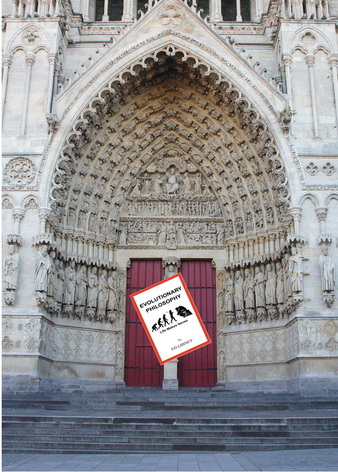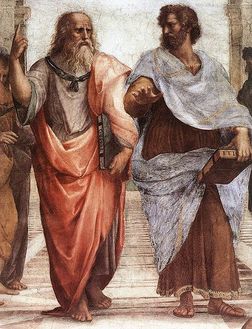
In last week's essay, I noted that when Erasmus was charged with “laying the egg that Luther hatched,” he half admitted the charge but said he had expected quite another bird. Erasmus may have opened the door to formal critique of the Catholic church when he published In Praise of Folly in 1511, but what kind of bird was it that charged through that door?
In 1517, when Martin Luther posted a large sheet on the All Saints' Church in Wittenberg, Saxony, his Ninety-Five Theses laid out "a devastating critique of the church’s sale of indulgences and explained the fundamentals of justification by grace alone." This was no mean feat considering that the Spanish Inquisition had recently been established in 1478. Heretics were being burned at the stake (or worse) at the hands of Catholic zealots all over Europe who were defending their dogma. Yet Erasmus kept some of those hounds at bay through the vast weight of his intellect. By the 1530s, for example, his writings accounted for 10 to 20 percent of all book sales. During the early years of the reformation, Erasmus "did much, mostly quietly and through private conferences and correspondence, to ensure that Luther was not abruptly silenced and put to death," even though he didn't fully approve of Luther's ideas and eventually broke publicly with him in 1524. Let's look more at Luther to understand why these enemies of a common enemy could not remain friends. It's a strange tale not often appreciated by all the sects of Christianity that owe their existence to this man.
Luther was born into a peasant family, but one that invested heavily in his education. He was just on the verge of becoming a lawyer in 1505 at the age of 21 when he was caught in very heavy thunderstorm. Afraid that he was going to die, he screamed out a vow: “Save me, St. Anna, and I shall become a monk!” He survived, of course, as most of us do from thunderstorms, but he did keep his promise to that loud rend in the air to enter the monastery, even though it was a difficult decision that Martin knew would greatly disappoint his parents. Beyond the vow, however, Luther had strong internal reasons to join the monastery, haunted by insecurity about his salvation, which he described as an overwhelming terror, calling them his anfectungen or afflictions. Luther was not alone in this experience. The "late medieval piety that Luther was a part of, which stressed Christ primarily as the avenging Judge, made spiritual terror, guilt, and despair the ordeal of many." Fleeing the fear inflicted by the church, Luther sought comfort in the only place that offered it…that very same church. Who could have guessed? Assurance evaded Luther though, as he grew disenchanted with all he saw on the inside of the institution that had offered him condemnation as well as salvation. He threw himself into the life of a monk, but it did not seem to help. Finally, a mentor told Luther to "focus on Christ and him alone in his quest for assurance," and this lead to Luther's break with the need for interventions from a religious hierarchy that he found to be full of abuses—especially nepotism, simony, usury, pluralism, and the sale of indulgences. After a dozen years in service, a mentally tortured Luther nailed his mounting objections to the wall.
Within two weeks, copies of the Ninety-Five Theses had "spread throughout Germany; within two months throughout Europe. In January 1518, friends of Luther translated the Ninety-Five Theses from Latin into German, printed, and widely copied them, making the controversy one of the first in history to be aided by the printing press." Once again, technology enabled progress. It took the Church almost three years to formulate a response, but in June of 1520, Pope Leo X issued a Papal bull outlining forty-one purported errors in Luther's theses. Luther was then summoned by the Holy Roman Emperor Charles V to either renounce or reaffirm his views in a grand assembly—known as a Diet—that was to take place in the town of Worms, Germany in what later became awkwardly known to English speakers as the Diet of Worms.
At the Diet, an imperial prosecutor asked Luther if a collection of his writings were indeed his and if he was ready to revoke their heresies. Luther requested time to prepare his answer and was given until the following day when he came back with an impassioned speech that encouraged others to take up his fight. He said:
Unless I am convinced by the testimony of the Scriptures or by clear reason (for I do not trust either in the pope or in councils alone, since it is well known that they have often erred and contradicted themselves), I am bound by the Scriptures I have quoted, and my conscience is captive to the Word of God. I cannot and will not recant anything, since it is neither safe nor right to go against conscience. May God help me. Amen.
Private conferences were held to determine Luther's fate, but before a decision was reached, Luther fled. During his return home, he disappeared though and went into hiding, for one month later the Edict of Worms was issued by Emperor Charles V, which declared:
We forbid anyone from this time forward to dare, either by words or by deeds, to receive, defend, sustain, or favour the said Martin Luther. On the contrary, we want him to be apprehended and punished as a notorious heretic, as he deserves, to be brought personally before us, or to be securely guarded until those who have captured him inform us, whereupon we will order the appropriate manner of proceeding against the said Luther. Those who will help in his capture will be rewarded generously for their good work.
Gimme some of that old time religion!
In January 1521, the pope excommunicated Luther, but this only emboldened him. In the summer of 1521, he "widened his target from individual pieties like indulgences and pilgrimages to doctrines at the heart of Church practices." Revolutionary theologians took his lead and embarked on a radical program of reform that "provoked disturbances, including a revolt by the Augustinian monks against their prior, the smashing of statues and images in churches, and denunciations of the magistracy." Bands of visionary zealots preached "revolutionary doctrines such as the equality of man, adult baptism, and Christ's imminent return." Luther set about reversing or modifying some of these new church practices, but he was unable to stifle the radicalism that had been unleashed by his passion. Preachers helped instigate the German Peasants' War of 1524–25, during which many atrocities were committed, often in Luther's name, but this was only the beginning of many religious wars in Europe that raged from 1524 to 1648.
Luther spent the rest of his days marrying a nun, raising six children, organizing the new church he had helped give birth to, and writing numerous volumes. Unfortunately, among Luther's other major works was his 60,000-word treatise On the Jews and Their Lies, published in 1543, three years before his death. Luther argued that the Jews were "no longer the chosen people but 'the devil's people', and referred to them with violent, vile language. Luther advocated setting synagogues on fire, destroying Jewish prayerbooks, forbidding rabbis from preaching, seizing Jews' property and money, and smashing up their homes, so that these 'envenomed worms' would be forced into labour or expelled 'for all time'. Luther's words 'We are at fault in not slaying them' amounted to a sanction for murder." According to the consensus view of historians, this anti-Jewish rhetoric from a man considered by Germans to be a major prophet contributed significantly to the development of antisemitism in Germany, and provided an "ideal underpinning" for the Nazis' attacks on Jews in the 1930s and 1940s almost 400 years later.
And yet there are Lutherans!
Though he does not fare well in my brief analysis of him in the survival of the fittest philosophers.
------------------------------------------------------
Martin Luther (1483-1546 CE) was a German priest, professor of theology and iconic figure of the Protestant Reformation.
Survives
Needs to Adapt
Luther kicked off the Protestant reformation with the publication of his “Ninety Five Thesis” on October 31, 1517, which attacked the church’s sale of indulgences. He was plagued by uncertainty and doubt about his own salvation until he found solace in Paul’s epistle to the Romans discussing God’s graciousness to the individual – this allowed him to rebel against the Catholic Church and its indulgences. He felt indulgences placed dependence on traveling salesmen instead of God. Luther was not a proponent of reason and science, but his forceful revolt enabled Christianity to be opened up to the evolutionary force of competition, which ultimately diminished its powers due to its weak intellectual basis.
Gone Extinct
Luther famously wrote that “reason is the devil’s whore.” He held though, that philosophy and reason are a great aid to society when used properly and a threat only when used improperly. The proper role of philosophy is organizational and as an aid in governance. Reason can be an aid to faith in that it helps to clarify and organize, but it is always second-order discourse; it is faith seeking understanding and never the reverse. Reason is the devil’s whore precisely because it asks the wrong questions and looks in the wrong direction for answers. Revelation is the only proper place for theology to begin, reason must always take a back seat. Reason discovers the truth. Truth must never take a back seat to revelation, faith, or theology. Truth is required for survival. By calling for an abandonment of reason and risking the survival of the species for the sake of its beliefs and its power, religion is the true evil and the true whore selling its soul for its own survival. No more - go extinct already!
------------------------------------------------------
Unfortunately, religion is far from extinct at the moment, though its influence is clearly waning. Fortunately for me, this marks the last of the influential philosophers of history who were primarily concerned with religion. From here on out, we can confine our discussions to more rational debates. Thank goodness!




